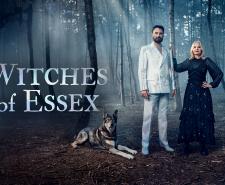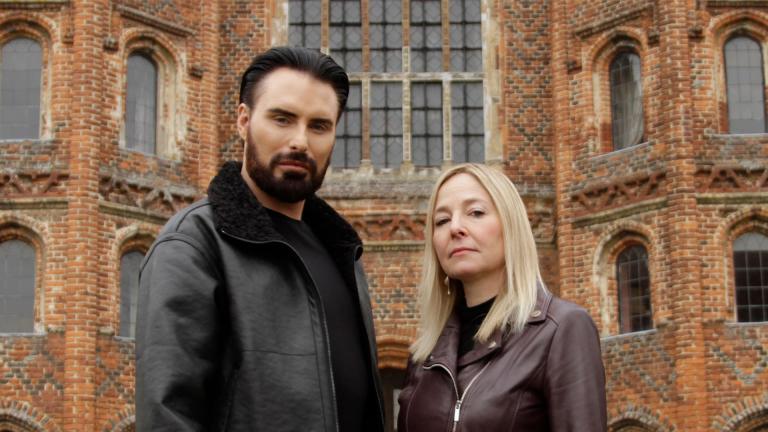
Witches of Essex
Available now on Sky HISTORY or stream now on HISTORY Play

When you think of witch trials, what comes to mind? Perhaps you picture the infamous Salem trials in America. But did you know that long before the hysteria reached Massachusetts, Essex was already a crucible of paranoia, persecution and state-sanctioned murder?
Hundreds of women were tried and executed on charges of witchcraft in 16th- and 17th-century England – and now a new Sky HISTORY series, Witches of Essex, reopens those cases with a modern lens.
At the heart of the investigation are two unlikely partners: Essex-born broadcaster Rylan Clark and historian Professor Alice Roberts. Together, they embark on a three-part journey that blends forensic analysis, expert testimony and dramatic reconstructions to revisit a grim chapter of Britain’s past.
We sat down with the pair to discuss the background to the series and what they’ve discovered. Witches of Essex starts Tuesday 14 October 9pm on Sky HISTORY and HISTORY Play.
Rylan Clark is many things – a talented performer, entertainer and broadcaster. But for all his on-screen talents, his love of history has been a well-guarded secret, up to now.
'I was obsessed with history from primary school,' he reveals. 'Whenever I thought about witchcraft I always thought of Salem, but actually Essex is the original. The reason Salem happened was because of Essex. I didn’t realise half the stuff happened twenty minutes from my house!'
For Alice, the project offered a chance to dig into a period that had fascinated her for years. 'This is serious, grim and troubling history,' she says. 'We are talking about misogyny. We’re talking about torture. We’re talking about state-sponsored violence against women. I wanted to understand how society could go so badly wrong – and I think there are lessons for us today.”
Each episode revisits a notorious Essex witch trial, drawing on original court documents and insights from historians, psychologists and forensic experts.
The first instalment takes viewers to Chelmsford in 1566, where poor villagers Agnes Waterhouse, her daughter Joan and her sister Elizabeth were among the first to face trial under a new Witchcraft Act that made sorcery a capital offence. 'You could literally have a big nose, a disability, a birthmark – and be accused,' says Rylan. 'If people didn’t like you and wanted you gone, you were a witch.'
Episode two moves to St Osyth in 1582, where a quarrel between two women spiralled into one of the largest witch hunts of the Elizabethan era. 'It’s shocking to see how communities can tear themselves apart,' Alice notes. 'You have superstition, fear and political ambition combining into something really destructive.'
The final chapter explores the rise of Matthew Hopkins, the self-appointed Witchfinder General whose reign of terror in 1645 saw women tortured and executed in Manningtree. 'This man was given the run of Essex to say whatever he wanted, get away with it, and women were killed because of him,' Rylan reflects. 'His book became the manual for persecution – and it went to America.'
Alice likens him to an early incel. 'He was a relatively young man who seemed to have quite a deep-seated hatred of women,' she explains. 'He would sit in pubs listening to people talking, writing it all down, collecting his "evidence" against women he would accuse of being witches. And no-one stopped him.'
Part of the show’s appeal lies in the dynamic between its two presenters. Alice, the scientist and sceptic, brings a forensic eye to the evidence. Rylan, with his Essex roots and openness to the supernatural, balances levity with genuine curiosity.
'We’re so opposite in so many ways, but that’s why it works,' says Rylan. 'Alice is very open to having a laugh, and I think she learned I’m not as stupid as I look!'
Alice agrees. 'Rylan’s passionately interested in history and very curious. He also bursts into song off-camera like we’re in some kind of cockney musical – and of course I joined in!'
Their camaraderie brings moments of warmth to what is otherwise a harrowing story of persecution. But both are clear that the tone remains respectful. 'This is true crime,' says Rylan. 'There are fun moments, but ultimately we both just want answers and to know why this happened.'
What emerges across the series is a picture of scapegoating, misogyny and fear – themes that feel uncomfortably familiar. 'A lot of it boils down to misogyny,' Rylan says. 'In the 1600s, men ran everything, and women were pushed into the background. That’s still prevalent today.'
'It’s misogyny writ large,' Alice agrees. 'Poor women, single women, lesbians – people who didn’t fit into society’s narrow expectations were disposable.'
She draws a stark parallel to modern times. 'Back then it was superstition and propaganda stoking fear and division. Today, we might call it fake news. History gives us perspective – and warns us how easily societies can go wrong.'
However, despite the similarities, Alice is also keen to stress just how much progress society has made. 'We have come a long way — laws have changed, and we have far better protections. But we mustn’t be complacent. We still see how easy it is to roll back human rights advances. That’s why it’s important to learn from the past.'
By the end of the series, both Alice and Rylan admit they were changed by the journey. 'We were living it,' Rylan says. 'Being in the houses where things happened, going to sleep thinking about it and waking up talking about it – you get obsessed.'
And though Witches of Essex concludes with Hopkins’ downfall, both presenters are tempted to follow the story further. Alice hints: 'There might be a road trip to Salem at some point.' Rylan is all in: 'Yes! To see how Hopkins’ actions influenced America would be fascinating.'
For now, Witches of Essex offers a powerful reminder of the dangers of fear and prejudice – and the human cost of hysteria. Part true crime, part historical investigation, and part ghost story, it shines a light on a dark chapter that still casts a shadow today.
Witches of Essex starts on Sky HISTORY and HISTORY Play on Tuesday 14th October. Want to hear the latest on more Sky HISTORY exclusives? Sign up to our newsletter today. Every week, you’ll receive fascinating history stories, news, clips and more, delivered straight to your inbox.